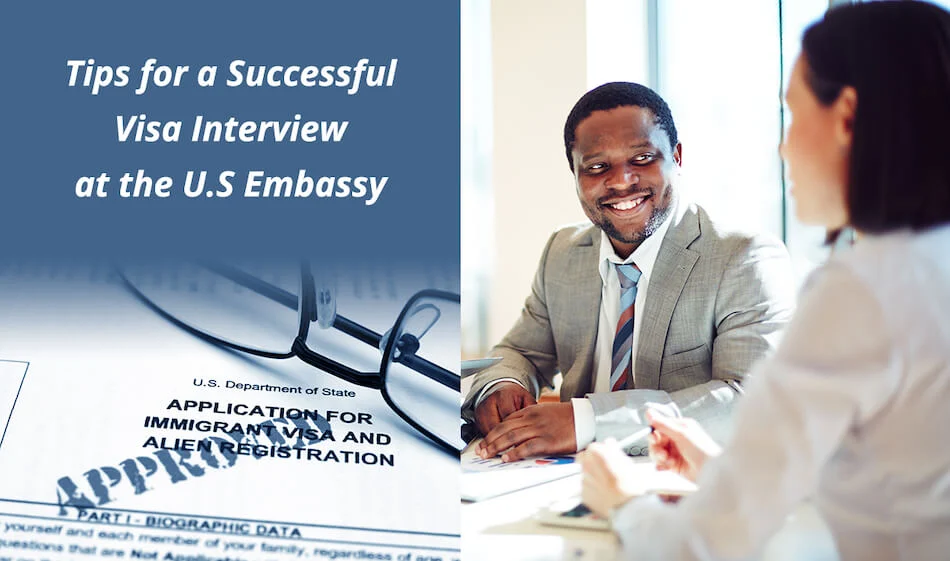Navigating the U.S. visa application process can be daunting, especially when it comes to the visa interview. This crucial step can determine whether you are granted entry into the United States for your intended purpose, be it tourism, study, or work.
To help you prepare effectively, this article outlines tips for a successful U.S. Visa application interview.
Understanding the Visa Interview Process
The visa interview is a pivotal moment in your application process. It typically takes place at a U.S. Embassy or Consulate in your home country. During this brief meeting, a consular officer will assess your application and determine your eligibility for a visa. Here’s what you can expect:
- Duration: Most interviews last between 2 to 5 minutes.
- Questions: Officers will inquire about your purpose for visiting the U.S., your ties to your home country, and your financial situation.
- Decision: You will usually receive an immediate decision regarding your visa application.
Preparing for the Interview
Preparation is key to a successful visa interview. Here are some comprehensive tips to help you get ready:
1. Gather Required Documents
Ensure you have all necessary documents organized and ready for the interview. Commonly required documents include:
- A valid passport
- Completed DS-160 visa application form
- Visa appointment confirmation
- Payment receipts for visa fees
- Supporting documents (e.g., proof of financial support, ties to your home country, and purpose of visit)
Having these documents readily accessible will demonstrate your preparedness and seriousness about your application.
2. Understand Your Visa Type
Different visa categories have specific requirements and expectations. Familiarize yourself with the type of visa you are applying for, whether it’s a B-1/B-2 tourist visa, F-1 student visa, or H-1B work visa. Understand the nuances of each visa type to effectively communicate your purpose during the interview.
3. Demonstrate Strong Ties to Your Home Country
One of the primary concerns of consular officers is whether you intend to return to your home country after your visit. To alleviate their concerns, you should:
- Present evidence of ties: This can include job contracts, property ownership, family connections, or community involvement.
- Articulate your plans: Be prepared to explain how your life in your home country will continue after your visit to the U.S.
4. Practice Common Interview Questions
Anticipate the questions you may be asked during the interview. Common questions include:
- What is the purpose of your visit to the U.S.?
- How long do you plan to stay?
- Do you have family or friends in the U.S.?
- What ties do you have to your home country?
Practicing your responses will help you answer confidently and concisely during the actual interview.
5. Dress Appropriately
First impressions matter. Dress professionally to convey seriousness and respect for the interview process. Consider wearing:
- A suit or formal attire
- Minimal accessories
- Neutral fragrances
Your appearance can influence the officer’s perception of your application.
6. Be Honest and Concise
During the interview, honesty is crucial. Provide truthful answers to all questions, as any discrepancies can lead to visa denial. Additionally, aim to be concise in your responses. Consular officers appreciate clear and straightforward answers, so avoid long-winded explanations.
7. Stay Calm and Confident
Anxiety is natural, but maintaining composure is essential. Take deep breaths and approach the interview with confidence. Remember that the officer is there to assess your application, not to intimidate you.
8. Speak for Yourself
If you are accompanied by family members, ensure that you are the one answering the questions. The consular officer wants to hear your perspective and assess your understanding of your application. If necessary, family members can wait in the waiting area.
9. Be Prepared for Follow-Up Questions
Sometimes, the initial questions may lead to follow-up inquiries. Be ready to elaborate on your answers or provide additional information. For example, if you mention a job, be prepared to discuss your role and responsibilities in detail.
10. Know Your Financial Situation
Be prepared to discuss how you plan to finance your trip. This includes:
- Providing bank statements or proof of income
- Explaining who will cover your expenses during your stay
- Demonstrating that you can support yourself without needing to work illegally in the U.S.
11. Understand the Importance of Nonimmigrant Intent
For nonimmigrant visas, you must prove that you do not intend to immigrate permanently to the U.S. This involves showing that you have a clear plan to return home after your visit.
12. Prepare for Possible Denial
While you should aim for a successful interview, it’s wise to prepare for the possibility of denial. If your visa is denied, ask the officer for specific reasons and any documentation that could help you in a future application.
Post-Interview Steps
After the interview, you may be required to wait for a decision. Here’s what to do next:
- Follow up: If you do not hear back within the expected timeframe, check the status of your application online or contact the consulate for updates.
- Gather additional documents if requested: Sometimes, officers may request further documentation after the interview. Be prompt in providing any requested materials.
Conclusion
Preparing for a U.S. visa application interview requires thorough planning and understanding of the process. By following these tips, you can enhance your chances of success. Remember to be organized, articulate, and confident in your responses. With the right preparation, you can navigate the interview process smoothly and increase your likelihood of obtaining a visa to the United States.
